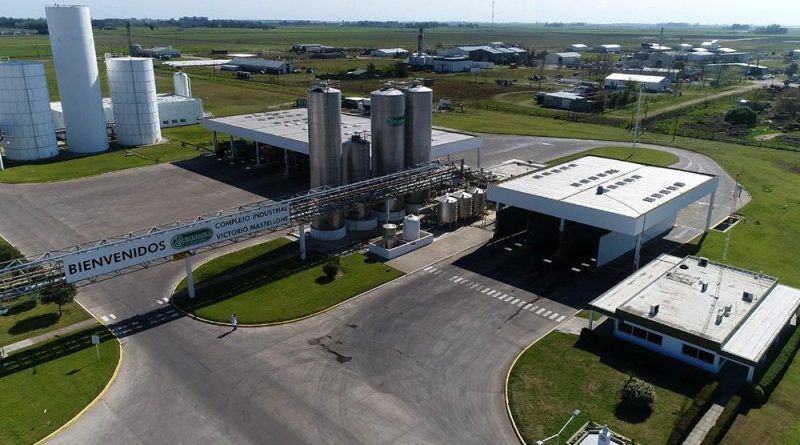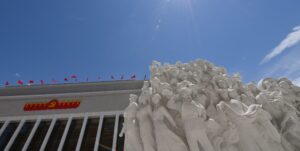
Mastellone Hnos., one of the largest dairy companies in Argentina, has taken a firm step towards environmental sustainability by consolidating its alliance with MSU Green Energy to increase the use of renewable energy in its operations. Since September, almost 63% of the energy used by the company comes from clean sources.
This decision is not recent, but dates back to 2020, when the company began to supply itself with renewable energy through an agreement with AES Argentina, which already covered 28% of its energy demand.
Carbon footprint reduction
This effort is part of a comprehensive strategy that seeks to minimize the environmental impact of the company’s operations. The facilities that will benefit from this new energy source include the Pascual Mastellone industrial complexes in General Rodríguez, and Victorio Mastellone in Trenque Lauquen, as well as other plants in various locations throughout the country.
With this change, the company far exceeds current regulations, which require large energy consumers to have at least 20% of their supply come from renewable sources by January 2025.
The impact of the agreement between Mastellone and MSU is significant, both for both companies and for the environment. According to Juan Oyarzábal, director of Industrial Operations at Mastellone Hnos., the use of renewable energy has allowed us to reduce the company’s carbon footprint by 22% since 2019.
The role of MSU Green Energy and its Pampa del Infierno solar park
MSU Green Energy, the company in charge of supplying this clean energy, plays a central role in Mastellone’s energy transition. The energy comes from the Pampa del Infierno solar park, located in the province of Chaco, which has the greatest capacity in Argentina to supply energy to industries. With an installed power of 130 MW, this solar park is an example of progress in the country’s energy infrastructure and a fundamental pillar in the decarbonization strategy of companies like Mastellone. The agreement between both companies, signed under the framework of the Renewable Energy Term Market (MATER), will be valid for ten years.
In addition to its alliance with Mastellone Hnos., MSU Green Energy has recently signed a similar agreement with the Georgalos company. This agreement aims to supply the Georgalos production plant, located in the city of Victoria, with solar energy. The energy will come from the solar parks operated by MSU, in particular also from the already named Pampa del Infierno Park. Thanks to this agreement, at least 30% of the Georgalos plant’s energy consumption will come from renewable sources, marking a milestone in the Argentine food sector.
Georgalos and MSU Green Energy: an agreement for energy sustainability in Argentina
Manuel Santos Uribelarrea, founder and CEO of the MSU Group, highlighted the importance of this type of alliances in the current context, where the transition towards clean energies is a prevailing need. According to the executive, the construction of solar parks like Pampa del Infierno is part of a broader vision that seeks to generate clean and accessible energy throughout the country. The company has eleven solar parks distributed in four provinces in northern Argentina, with a total generation capacity of 655 MW, which reinforces its role as one of the most important players in the renewable energy sector.
The agreement between Mastellone Hnos. and MSU Green Energy is not only an advance in the energy policy of both companies, but also a significant contribution to the development of renewable energy infrastructure in Argentina. The commitment to the use of clean energy is aligned with a global trend towards sustainability and responds to the need to reduce carbon emissions and mitigate the effects of climate change.
In a context where energy demand continues to grow, especially in large-scale industrial sectors, it is essential that companies adopt these types of measures.
Economic and environmental advantages of solar energy
In addition to environmental benefits, the transition to renewable energy also has economic advantages. Using solar energy, in particular, can reduce long-term operating costs, as renewable sources tend to be more stable and predictable in price, compared to fossil fuels, which are subject to market fluctuations. international. For a company like Mastellone Hnos., which depends on high energy consumption in its production processes, this stability maintains its competitiveness in the market.
Mastellone Hnos.’s commitment to sustainability is not limited only to the energy field. The company has implemented various initiatives aimed at improving its environmental practices, from reducing waste to optimizing water use and improving the efficiency of its production processes. All of this is part of a global strategy that seeks not only to comply with environmental regulations, but to go further and become a reference in terms of sustainability in the Argentine dairy sector.
Sustainability coincides with the company’s 95th anniversary, a milestone that reinforces its leadership in the Argentine market and its ability to adapt to changes in the environment. For almost a century, Mastellone Hnos. has been synonymous with quality and innovation in the dairy sector, and its commitment to the environment reflects its long-term vision and its responsibility towards future generations.
The alliance between Mastellone Hnos. and MSU Green Energy is a decisive step in the energy transition of the industrial sector in Argentina. These types of initiatives, supported by long-term agreements and investment in renewable infrastructure, are essential to guarantee a cleaner and more efficient future for the country.
Energy journalist
Source: https://reporteasia.com/negocios/2024/10/04/mastellone-y-msu-se-unen-para-impulsar-el-uso-de-energia-renovable/

